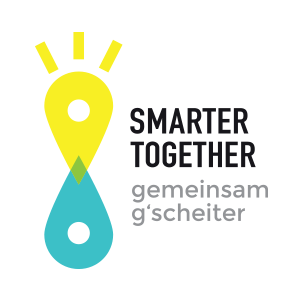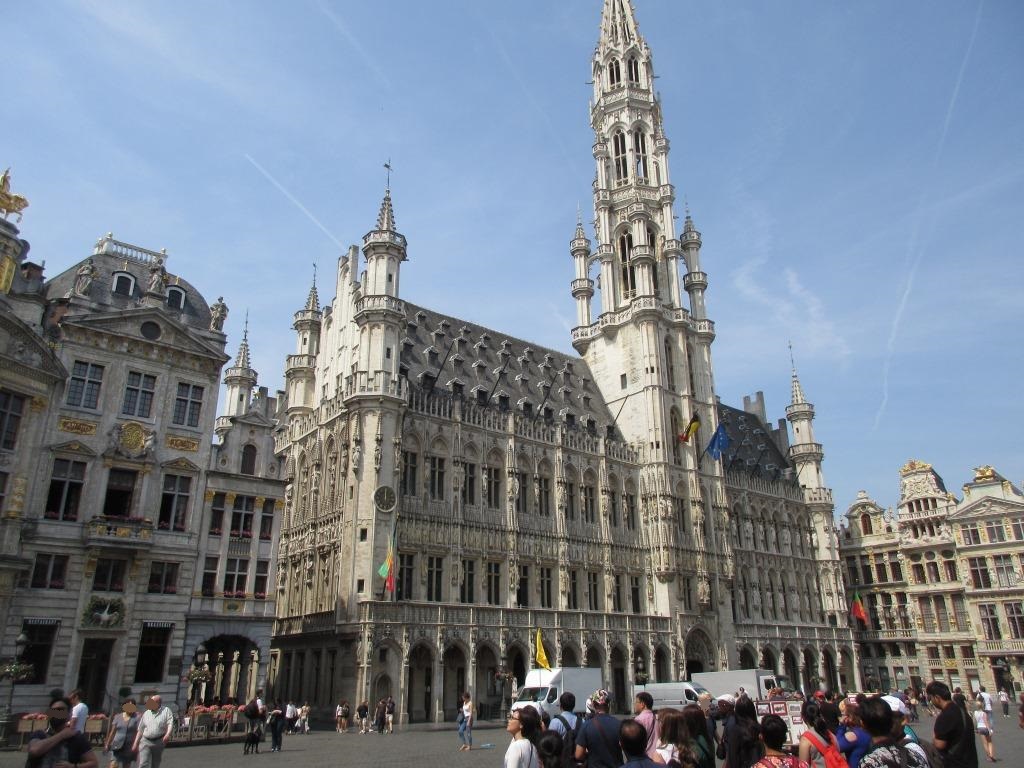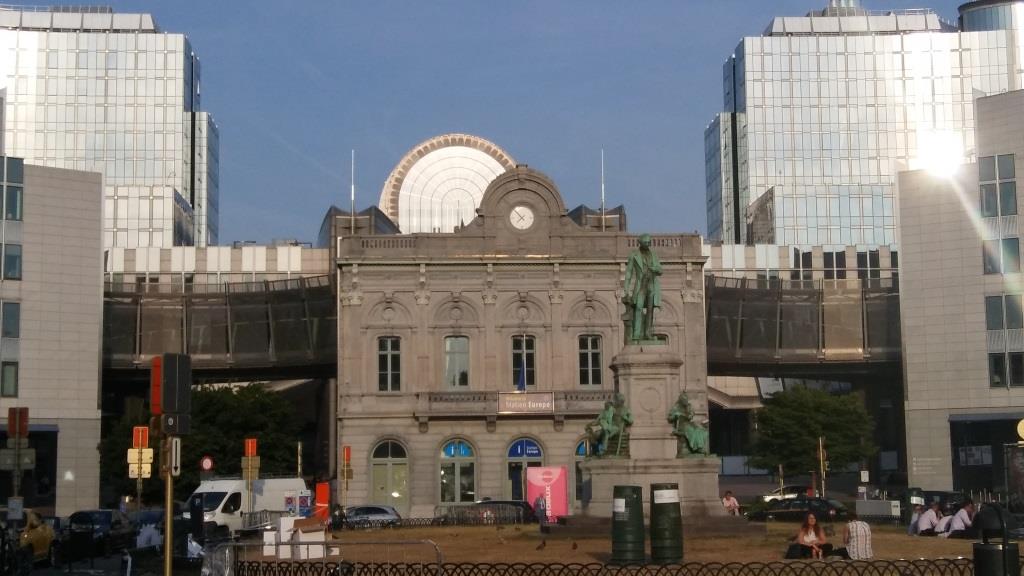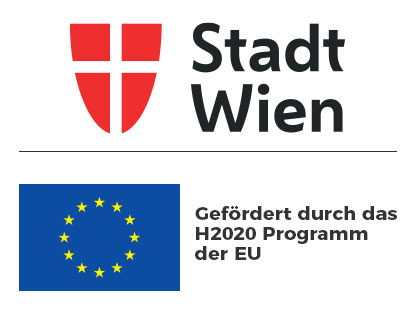Sanierung von Mehrparteienwohnhäusern im Fokus
CEN Workshop in Brüssel
Am 21. und 22. November 2018 fand in Brüssel ein „SMARTER TOGETHER – CEN-Workshop“ statt, der Fachleute zum Thema nachhaltiger Sanierung von Mehrparteienwohnhäusern mit Eigentumsgemeinschaften zusammenbrachte („Sustainable Energy Retrofit Process Management for Multi-Occupancy Residential Buildings with Owner Communities“).
Dabei bring das CEN – Das European Committe for Standardization (das Europäische Standardisierungskommittee) Einrichtungen, die die Standardisierung zur Aufgabe haben, aus 34 Ländern zusammen. Zum genannten Thema war auch die Expertise von Smarter Together bzw. der Stadt Wien gefragt. So konnte der Wiener Ansatz in den europäischen Diskurs eingebracht werden.
Rathaus Brüssel, Foto Bojan Schnabl
Leopold-Bahnhof mit Europäischem Parlament in Brüssel
CEN Workshop Agreement
Beim gegenständlichen CWA (CEN Workshop Agreement) geht es um den Prozess, wie Wohnungs-Eigentumshäuser mit heterogener BewohnerInnen und BesitzerInnenstruktur nachhaltig saniert werden können. Die Besondere Herausforderung liegt dabei in den zum Teil sehr unterschiedlichen Zielen und finanziellen Möglichkeiten der BesitzerInnen. Hier ist insbesondere die Frühe Phase des Prozesses (Grundlagenerhebung, Information und Beteiligung) wesentlich.
Teilnehmer waren Vertreter bzw. MitarbeiterInnen von COMATSPA, IBP Fraunhofer, Electricité de France, der britischen Energy Saving Trust, der Stadt Wien (Daniel Glaser) sowie der DIN.
Hintergrund
Während Wien traditionell einen hohen Anteil von Mietshäusern hat, ist europaweit ein starker Anteil von Eigentumsgemeinschaften von Mehrparteienwohnhäusern zu verzeichnen. Im Gegensatz zu Wien, dass mit seinen Förderinstrumenten die Sanierung von Mehrparteienwohnhäusern unabhängig von der Eigentümerstruktur strategisch vorantreiben kann – und Smarter Together in Wien hat das bei der Projektumsetzung mehrfach bewiesen – sind parifizierte Mehrparteienwohnhäuser europaweit eine Herausforderung hinsichtlich der Sanierung. Wien kann mit seiner traditionellen Wohnungsstruktur mit Mietschwerpunkt viel eher einen Beitrag zu den Klimazielen leisten als Eigentümergemeinschaften. Das war bereits eine Schlussfolgerung der Tagung in Larnaka. Vergleich dazu den Beitrag Innovate in Larnaka auf Zypern.
Quelle: https://www.cen.eu/news/workshops/pages/ws-2018-007.aspx
English Summary / Zusammenfassung in Englisch:
CEN/WS “Sustainable energy retrofit" in Brussels
CEN/WS “Sustainable energy retrofit process management for multi-occupancy residential buildings with owner communities” On 21st and 22nd of November 2018 Daniel Glaser from Vienna’s Smarter Together project participated in a „SMARTER TOGETHER – CEN-Workshop“ on „Sustainable Energy Retrofit Process Management for Multi-Occupancy Residential Buildings with Owner Communities“. The major challenge European flat owners in owner communities face are the highly complicated processes to find an agreement on necessary retrofits. For policymakers this makes a strategic refurbishment in line of the climate goals even more challenging. Vienna has shown – and Smarter Together confirmed this, that Vienna’s structural advantage of a high share of rental flats as well as its subsidy mechanism is more likely to substantially contribute to the climate goals through systematic housing refurbishment. This has been already a conclusion of the INnovate – Smarter together meeting in Larnaka. See report here: https://www.smartertogether.at/innovate-in-larnaka/ CEN/WS “Sustainable energy retrofit process management for multi-occupancy residential buildings with owner communities” In the framework of the EU Smart City Project SMARTER TOGETHER, this Workshop will develop a CEN Workshop Agreement (CWA) which will describe a workflow and an overall quality and process management methodology for the resource efficient retrofit of existing multi-occupancy residential buildings with owner communities. The target group of the standard are all relevant process stakeholders including owner communities, property managers, owner community boards, planners, energy efficiency consultants, and policymakers. The kick-off meeting and first plenary took place on 27 June 2018 in Sofia, Bulgaria. Source: https://www.cen.eu/news/workshops/pages/ws-2018-007.aspx CEN, the European Committee for Standardization, is an association that brings together the National Standardization Bodies of 34 European countries. CEN is one of three European Standardization Organizations (together with CENELEC and ETSI) that have been officially recognized by the European Union and by the European Free Trade Association (EFTA) as being responsible for developing and defining voluntary standards at European level. CEN provides a platform for the development of European Standards and other technical documents in relation to various kinds of products, materials, services and processes. CEN supports standardization activities in relation to a wide range of fields and sectors including: air and space, chemicals, construction, consumer products, defence and security, energy, the environment, food and feed, health and safety, healthcare, ICT, machinery, materials, pressure equipment, services, smart living, transport and packaging. A CEN Workshop Agreement (CWA) is a document published by CEN in at least one of the CEN three official languages. A CWA is an agreement developed and approved in a CEN Workshop; the latter is open to the direct participation of anyone with an interest in the development of the agreement. There is no geographical limit on participation; hence, participants may be from outside Europe. The development of a CWA is fast and flexible, on average between 10-12 months. A CWA does not have the status of a European Standard. It involves no obligation at national level. A CWA may not conflict with a European Standard; if a conflicting EN is subsequently published, the CWA shall be withdrawn.
Daniel Glaser, Bojan Schnabl, Quelle: CEN




 Bojan Schnabl
Bojan Schnabl Stadt Wien, MA 18
Stadt Wien, MA 18